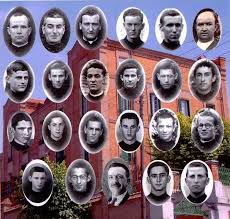HOMILY WEEK 03 05 – Year I
Faith and Love Make all the Difference
(Heb 10:32-39; Ps 37; Mk 4:26-34)
***************************************
The late Brother Anton Zisper OMI had a unique sense of humor. His comment about a set of identical twins was, “They really look alike, one more so than the other!”
The readings today present us with two similar yet different messages – almost like two sides of a coin. One describes the Kingdom of God; the other how it is ideally lived out in our lives.
In the Gospel, Jesus preaches in parables about the Kingdom of God. Most of Jesus’ parables were about the Kingdom of God. In one parable today, God is like a farmer who plants a seed. The Kingdom is like the seed that grows quietly and invisibly, yet powerfully, until the harvest. In another, the kingdom is like a small mustard seed that becomes a large bush in which the birds of the air can find security and shelter.
These parables about the Kingdom emphasize the quiet, humble, unassuming way that God is present and at work in our lives. A natural practice flowing from these parables would be the art of contemplation – just being in God’s presence, in silence which is the language God speaks best, simply trusting that God is doing whatever God wants to do in us as we allow God the space and time to do God’s healing work.
The biblical example for this kind of prayer is Mary of Bethany who was sitting at the feet of Jesus, the posture of a disciple. According to Thomas Keating, a master of centering and contemplative prayer, she was not so much listening to Jesus’ words, but very aware that she was in the presence of the Word of God. The words Jesus might have been uttering were not that important to her – she was more involved with just soaking up Jesus’ loving presence.
 A real life example of this kind of prayer is fifteen-year old Naomi returning from a soccer tournament. She burst into the house, threw down her duffle bag, went directly to her father who was speaking with me visiting, sat on his lap, put her arm around his shoulder, laid her head against his, and just lay there soaking up her father’s love for at least two minutes. She didn’t say a word, as he continued talking to me over her. I left left deeply moved by this experience of an intimate, wholesome, wordless loving relationship of a father and daughter. I reflected that this was as close as I would get in this life to seeing God with my two eyes, and knew I would never forget this incident.
A real life example of this kind of prayer is fifteen-year old Naomi returning from a soccer tournament. She burst into the house, threw down her duffle bag, went directly to her father who was speaking with me visiting, sat on his lap, put her arm around his shoulder, laid her head against his, and just lay there soaking up her father’s love for at least two minutes. She didn’t say a word, as he continued talking to me over her. I left left deeply moved by this experience of an intimate, wholesome, wordless loving relationship of a father and daughter. I reflected that this was as close as I would get in this life to seeing God with my two eyes, and knew I would never forget this incident.
That is the kind of prayer into which we are invited by the parables about the seed growing invisibly, and the mustard seed, as part of our living in the Kingdom of God.
For its part, the Book of Hebrews speaks of the Kingdom of God in a different way. It reminds us the gift of faith in the love that Jesus Christ has for us has enlightened us, has given us a true perspective on life. That gift, however, sets us apart and comes with a cost, as those who don’t understand or accept this gift may even resort to persecution. We are given a word of encouragement so that, should that happen to us, we can cheerfully accept suffering and even dispossession of our goods, because we possess something better and more lasting. That “something” is the love of Jesus Christ for us, and the eternal life that he offers us, which no one can take away.
St. John Chrysostom describes this attitude beautifully in a homily in the Office of Readings for the feast of the conversion of St. Paul on January 25th. He writes, “The most important thing of all to Paul was that he knew himself to be loved by Christ. Enjoying this love, he considered himself happier than anyone else; were he without it, it would be no satisfaction to be the friend of principalities and powers…. To be separated from that love was in his eyes, the greatest and most extraordinary of torments… So too, in being loved by Christ, he thought himself as possessing life, the world, the angels, present and future, the kingdom, the promise and countless blessings.
Apart from that love nothing saddened or delighted him; for nothing earthly did he regard as bitter or sweet. Paul set no store by the things that fill our visible world, any more than a man sets value on the withered grass of the field. As for tyrannical rulers of the people enraged against him, he paid them no more heed than gnats. Death itself and pain and whatever torments might come were but child’s play to him, provided that thereby he might bear some burden for the sake of Christ.”
Hebrews adds that we are not those who shrink back, but among those who have faith and so are saved. These words take on even greater relevance today as there are more Christians being persecuted and even martyred for their faith than at any time before in our history.

Spanish OMI Martyrs
The martyrdom of 22 Oblates of Mary Immaculate, priests, brothers and scholastics, in Pozuelo de Alarcón (Madrid), happened during the period of the great religious persecution in Spain, in the three years 1936-1939, when thousands of Christians were killed for belonging to the Church. Despite the psychological torture during the cruel captivity no one apostatized, nor lost faith, nor complained of having embraced a religious vocation. The exact words of Clemente Rodriguez Tejerina, 18 years old, were recounted by his sister: “We are in danger and we fear that we will be separated; we encourage each other. But even if we have to die, I am ready, and I am sure that God will give us the strength that we need to be faithful….”
From 1954 – 1970, 17 missionaries and lay faithful were persecuted and martyred in Laos. Six of them were Oblates. All refused to renege their faith and their religious life, and that cost them their lives. They also shared that faith-filled spirit of St. Paul and built up the Kingdom of God with their blood.
So we are invited to live out the Kingdom of God as did St. Paul and these martyrs, totally immersed in and focused on the love of Jesus Christ for us – much like Naomi with her father. The kingdom of God is within us – all we need do is try to open ourselves to its reality and foster its growth by trying to be attentive to the people and situations around us.
The Eucharist is an experience of that love of Jesus that transformed the life of St. Paul, and is also especially available to us through contemplative prayer.
So let us place our total trust in Jesus Christ and his love for us, soak up that love through contemplative prayer and the Eucharist, and like St. Paul, spend ourselves sharing that Good News with all others.



